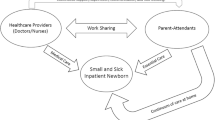Abstract
Family-centered care (FCC) is a well-evidenced approach, recognized as the standard of care for newborns and children. This approach promotes a mutually beneficial partnership between health professionals and infant/young children’s families, providing an opportunity for developing trustful relations and transparency of care. Implementation experience from our newborn intensive care unit highlighted three prerequisites for successful implementation, which include adequate infrastructure and basic amenities for the primary caregiver; attitudinal change amongst healthcare providers accepting parents/family as partners in the care of the newborn; and active involvement of primary caregivers in baby care activities alongside the nurses. Healthcare providers played a crucial role in empowering parents, improving their confidence and competence to transition into the role of primary caregivers after discharge. FCC contributes to all domains of nurturing care and has relevance in newborn care and pediatric care at all levels, with scope for being expanded to the antenatal and postnatal period to promote early childhood development. With national scale-up in progress, addressing actual or perceived barriers to implementation requires context-specific adaptation and the best use of opportunities and funding support available under the national health program.
Similar content being viewed by others
References
Every Preemie Scale. Family Participation in the Care of the inpatient Newborn. Do No Harm Technical Brief. Available from: https://www.everypreemie.org/wp-content/uploads/2018/11/DNH_TechBriefFamilyParticipation11.17.18Final.pdf. Accessed January 18, 2021.
Sarin E, Maria A. Acceptability of a family-centered newborn care model among providers and receivers of care in a Public Health Setting: A qualitative study from India. BMC Health Service Res. 2019;19:184.
Jotzo M, Poets CF. Helping parents cope with the trauma of premature birth: an evaluation of a trauma-preventive psychological intervention. Pediatrics. 2005;115:915–9.
Melnyk BM, Feinstein NF, Alpert-Gillis L, et al. Reducing premature infants’ length of stay and improving parents’ mental health outcomes with the Creating Opportunities for Parent Empowerment (COPE) neonatal intensive care unit program: a randomized, controlled trial. Pediatrics. 2006;118:e1414–27.
De Bernardo G, Svelto M, Giordano M, et al. Supporting parents in taking care of their infants admitted to a neonatal intensive care unit: a prospective cohort pilot study. Ital J Pediatr. 2017;43:36.
Ortenstrand A, Westrup B, Broström EB, et al. The Stockholm Neonatal Family-centered Care Study: Effects on length of stay and infant morbidity. Pediatrics. 2010;125:e278–85.
Roué JM, Kuhn P, Lopez Maestro M, et al. Eight principles for patient-centered and family-centered care for newborns in the neonatal intensive care unit. Arch Dis Child Fetal Neonatal Ed. 2017;102:F364–68.
Verma A, Maria A, Pandey RM, et al. Family-centered care to complement care of sick newborns: A randomized controlled trial. Indian Pediatr. 2017;54:455–9.
Kumar H, Bhat A, Alwadhi V, et al. An Assessment of implementation of family participatory care in special newborn care units in three states of India. Indian Pediatr. 2021:58:349–53.
Ministry of Health and Family Welfare, Government of India. Operational Guidelines on Family Participatory Care for Improving Newborn Health. MoHFW; 2017. Accessed January 18, 2021. Available from: http://nhm.gov.in/images/pdf/programmes/child-health/guidelines/Family_Participatory_Care_for_Improving_Newborn_Health-Operational_guideline.pdf
World Health Organization, 69th World Health Assembly. Framework on integrated, people-centered health services, WHO; 2016. Accessed February 16, 2021. Available from: http://apps.who.int/gb/ebwha/pdf_files/WHA69/A69_39-en.pdf?ua=1.
WHO, UNICEF, World Bank Group. Nurturing Care for Early Childhood Development: A Framework for Helping Children Survive and Thrive to Transform Health and Human Potential. WHO; 2018. Accessed January 13, 2021. Available from: https://www.who.int/maternal_child_adolescent/child/nurturing-care-framework/en/
World Health Organization. Survive and Thrive: Transforming Care for Every Small and Sick Newborn, 2019. WHO; 2019. Accessed on February 16, 2021. Available from: https://www.who.int/maternal_child_adolescent/documents/care-small-sick-newborns-survive-thrive/en/
World Health Organization. Standards for improving Quality of Care for Small and Sick Newborns in Health Facilities, 2020. WHO; 2020. Accessed on February 16, 2021. Available from: https://www.who.int/publications/i/item/9789240010765
Child Health Division, Ministry of Health and Family Welfare, Government of India. India Newborn Action Plan, 2014. Accessed February 20, 2021. Available from: https://www.newbornwhocc.org/INAP_Final.pdf
Maria A. India case study on family participatory care: A gateway to nurturing care for small and sick newborn included for launch of nurturing care framework launch for early childhood development at 71st World Health Assembly, May 2018, Geneva. Accessed January 18, 2021. Available from: http://nurturing-care.org/wp-content/uploads/2018/05/nurturing-care-case-study-india.pdf
Funding
Funding: None
Author information
Authors and Affiliations
Contributions
Contributors: AM: developed the outline of the manuscript and drafted the manuscript, provided technical guidance on the content and reviewed the manuscript; DA: contributed to manuscript writing and revision. Both authors approved the final version of manuscript.
Corresponding author
Ethics declarations
Competing interest: None stated.
Additional information
Note: DA is a staff member of the World Health Organization. The author alone is responsible for the views expressed in this paper and they do not necessarily represent the decisions, policy or views of the World Health Organization.
Electronic supplementary material
Rights and permissions
About this article
Cite this article
Maria, A., Agrawal, D. Family-Centered Care for Newborns: From Pilot Implementation to National Scale-up in India. Indian Pediatr 58 (Suppl 1), 60–63 (2021). https://doi.org/10.1007/s13312-021-2358-4
Published:
Issue Date:
DOI: https://doi.org/10.1007/s13312-021-2358-4




